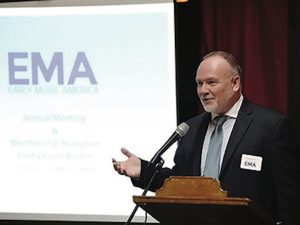 A stamp of Justin S. Morrill’s image hanging in a congressional hearing room was a recent reminder of Chris Bone’s (’79) time at Michigan State University. chris bone
A stamp of Justin S. Morrill’s image hanging in a congressional hearing room was a recent reminder of Chris Bone’s (’79) time at Michigan State University. chris bone
Walking through the W.J. Beal Botanical Garden, singing with friends in the Music Practice Building, studying English literature and earning a degree in mathematics were some of the experiences he reflected on during an interview at his office in Washington, D.C.
A high school student from Washington state who came to MSU as an Alumni Distinguished Scholar, Bone quickly found friends who also were from outside the state of Michigan.
“The different opportunities to explore areas of study appeared to me as a banquet; I think I took 21 credits my first term,” he said. “I even talked my way into a senior level seminar on the Rise of the Novel. (The professor) was pretty skeptical, but because of the Honors College background, he was willing to give me a chance.”
Bone said after the seminar was complete, he worked on an independent study with the same professor.
The ability to sample coursework across a variety of fields is something Bone enjoyed – and something he encourages other Honors College students to try.
“The opportunity to take an eclectic course of study, sampling from many fields, I think is one of the things the Honors College gave me,” he said. “I loved my time at Michigan State.”
For much of his professional career, Bone has worked as an actuary, most recently as director of the Policy, Research and Analytical Department for the federal Pension Benefit Guaranty Corporation. In that role, he supervised a team running a model of the U.S. private sector pension system, which covers 40 million people.
As someone who has focused much of his career on retirement policy, Bone is concerned about the ability of the country to succeed in keeping retirement promises to the Baby Boomers and later generations. He left his federal post in September 2017 and is exploring new opportunities in the political sphere.
Bone said being an actuary is the type of work that engages a person in “flow” and he’s enjoyed it. Prior to his post in the federal government, Bone worked for AT&T and Aon Consulting, running its U.S. retirement practice.
He also has served as a member of several boards, including a post as president of the board for Early Music America. Bone has a collection of shawms – the predecessor to the oboe – as well as other instruments.
“Playing polyphonic music very much focuses the mind,” he said.
He has also served on a number of non-profit boards that focus on retirement and outcomes.
This article was originally published in HConnections 2017.
